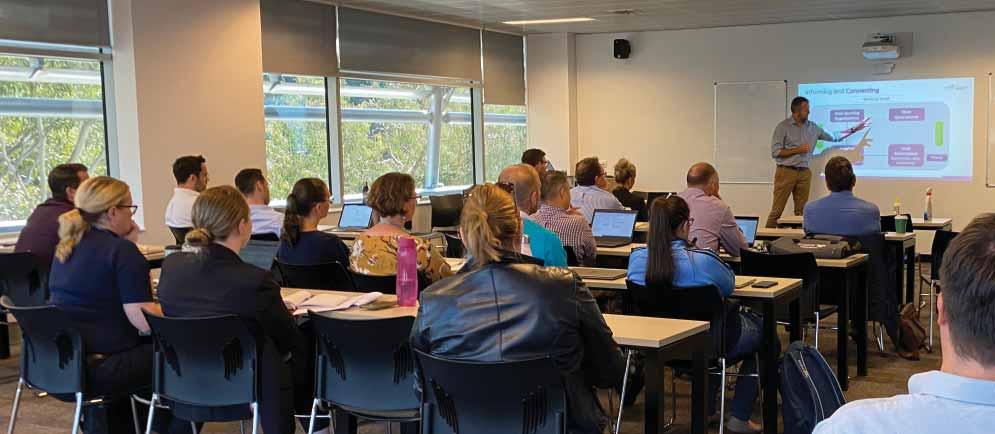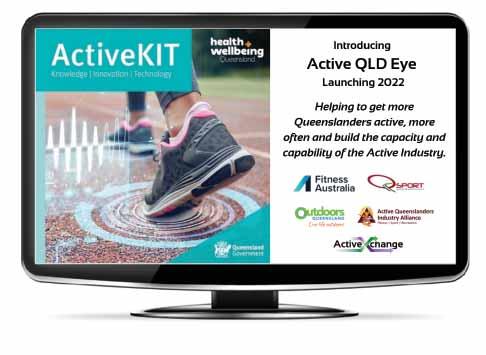
8 minute read
Making the most of Insight
ActiveXchange’s James Ellender explains how delivering insights to industry decision-makers will shape a more informed, connected and active industry
Coined in 2006, the metaphor ‘data is the new oil’ and the 2011 inference that ‘information is the oil of the 21st century, and analytics is the combustion engine’ sings true amid the myriad of challenges to date in capitalising on ‘data’ throughout community aquatic, recreation and sport industry.
Advertisement
Ahead of what is likely to be a truly exciting decade, finishing with the Brisbane 2032 Olympics, if ‘data is the new oil’ can it be part of the step-change required to deliver the Australian Government’s bold vision for sport and ensure we are the ‘world’s most active and healthy nation known for its integrity and sporting success’?
Separating the metaphor, oil is consumed, but data is created. When oil is used it’s consumed once and permanently destroyed. Data, on the other hand, is created and does not have to be destroyed even after it’s used for analytics.
However, we continue to see this so-called ‘growth fuel’ locked away in silos, fragmented, unrefined and with relatively low value. Like oil, data is only valuable if it is in a usable form. Just as crude oil is transformed into more useful products such as petroleum in oil refineries, raw data needs to be preprocessed before it can be used for analytics.

The popularity of the phrase, “data is the new oil” in Google searches. Image source: Google Trends.
So where do we start with data? In the information age, human action generates data every day and here are some industry examples: -When someone joins a gym, swimming program or sport, they are creating data. -When someone brings a friend, they have created data that can be used to grow participation. -When someone swipes their membership card or checks in for a game, they are creating data for a recommendation algorithm.

In recent years, ActiveXchange has taken the sector a long way in building trust, collaborations and partnerships by building a connected ecosystem (refinery) focussed on changing the game when it comes to using data to empower decision making, investment and reporting on outcomes using evidence (data) via its tech solution - ‘SportsEye’.
As the industry’s leading data technology platform, we are passionate because we have lived with the challenges in harnessing data across the sector and know the reality that data science is not a core skill, nor affordable, for the majority of organisations we partner with.
However, to stay ahead, leaders are becoming increasingly aware of the need to understand and master data related to their performance to positively influence stakeholders, requiring a shift beyond aggregating information, to actually analysing the insights and ‘so what next’ scenarios – efficiently, cost-effectively and importantly, consistently at scale.
Taking it one step further, ActiveXchange has built strong relationships with leading management system providers to ensure a smooth movement of data when required, taking the heavy lifting away from leisure operators and sports. This is a significant step towards changing the game and creating a true ecosystem through market insights.
How do we protect data? Through local, state, federal and now international partnerships, ActiveXchange has been tackling some of the bigger issues around privacy and ethics that come into play when collecting data.
While data might be infinite, a significant amount of potentially useful data may be protected by privacy guidelines and laws. Naturally, there are also ethical concerns that may occur when using data collected from customers.
This has largely been ActiveXchange’s role, pioneering an important way forward, investing in data infrastructure through our participation with the Federal Government’s AusIndustry Accelerator program, as well as overseeing the collection of quality data that is actually useful for a range of stakeholders who are equally charged with making more people, more active.
We know that our partners’ data (and the data of their partners, members and stakeholders) is important, and the security of it is paramount, and from the outset, we have implemented strict principles in the way we use and store the information shared with us.
Once concerns are overcome, trust grows, and collaboration evolves however, what is typically seen is the reality that data collected typically suffers from some of the following flaws: -The data contains inconsistent or inaccurate information. -The data contains missing information. -The data does not represent the population that it was intended to represent. -The data is not in a form that is ready for predictive analytics.
As we look towards reaching an important milestone of onboarding 100 state sporting organisations by the end of 2021, we have spent a significant amount of time through our Chair, Martin Sheppard, listening to government, private, not for profit and peak bodies using SportsEye, and those who don’t, to ensure that we continue to progress.
Introducing ActiveXchange’s Expert Circles This recent work has culminated into the launch of ActiveXchange’s ‘Expert Circles’ via collaborative partnerships with over 30 leaders who have decided to proactively connect to SportsEye and unlock the potential of data.
According to Sheppard, “COVID-19 has shown us how both


Federal and State Governments have embraced the rationale that health evidence should ‘provide guidance on decision making’, whether that would be to lock down or open up! As many Premiers have said, this removes the political part of the decision making. “As a society, we now have a greater understanding of the benefits of embracing the right data, exploring the insights this presents to then make the best decisions, whether that is for strategy and policy development or management decisions. Within our sector, one of the key challenges has been the degree of confidence surrounding the data available. For years we have used the same data to ask different questions, many times without understanding enough about the data or the question.”
ActiveXchange has been working with leisure and sport, and more recently with a number of state governments and bodies, to capture the data that is available for supply and demand, retention, health and wellbeing and future needs. As the challenges have been highlighted, specific solutions have been delivered. Now though, key thought leaders have come together to resolve the thinking around additional challenges and which data should be used to answer them.
Four Industry ‘Expert Circles’ have been established to think about what we can do in the run-up to Brisbane 2032 and beyond: -How active or inactive is our community? -What is the current participation in organised activities? (e.g. events, programs, activities or membership) -Where is the infrastructure needed to cope with the current and future demand? -What is the social and community value of participation?
Each group has key thought leaders from all levels of government, sport, health, consultants, academia and data analysts, joined by ActiveXchange to consider key opportunities and gaps in data and knowledge.
Phil Reeves, Executive Chair of Active Queenslanders Industry Alliance (AQIA) joined after recently connecting with ActiveXchange as AQIA collectively build ‘Active QLD Eye’ alongside QSport, Outdoors Queensland and Fitness Australia thanks to the Department of Tourism, Innovation and Sports ACTIVE KIT grant program.
According to Reeves, “we’re looking forward to building on top of the significant experience ActiveXchange brings, to enable collaboration with organisations, commercial operators and councils across Queensland to track, over time, our sector’s impact on Queenslanders who are insufficiently active and our ability to strengthen the capability of organisations within the industry.”
Mitchell Malone, Associate Director, Management Consulting & Economics at KPMG, notes “as a consultant in the industry, we have seen that everyone is tackling the inactivity challenge in various ways and to varying degrees of success across the country.
“It is a fantastic initiative to get these different voices from across the sector together on a regular basis to share insights and collectively confront these issues. A consistent and robust approach to physical activity data will accelerate the journey the sector is on regarding the measurement of the social and economic benefits of sport and recreation, and will benefit everybody.”

Kathy Parton, who sits on a number of national working groups and industry bodies, and is Chief Executive of Aquatics and Recreation Victoria (ARV), explains “I’m looking forward to participating in the Expert Circles to enable a national discussion, and response, on key industry issues including how we collectively create and strengthen our capability to enable a joined up, data driven approach to planning, investment and delivery across local government, community sport, leisure, aquatics and fitness to encourage more people to be physically active, more often and in more places.”
By understanding the key questions, the circles will identify how the data and knowledge needed to ‘close any gap’ on missing data sources can be solved.
Options may include further research, embracing current data by third parties, alignment of modelling to better inform the industry and investment in future work. With Sport Australia, various state departments of sport and recreation, as well as facility operators, academia and major event promoters, access to non-membership data, will be critical for future planning, decision making and strategy/policy development. James Ellender is Chief Executive of ActiveXchange. If industry members wish to be involved, they should contact Martin Sheppard, Chair of ActiveXchange at martin@activexchange.org.au.











